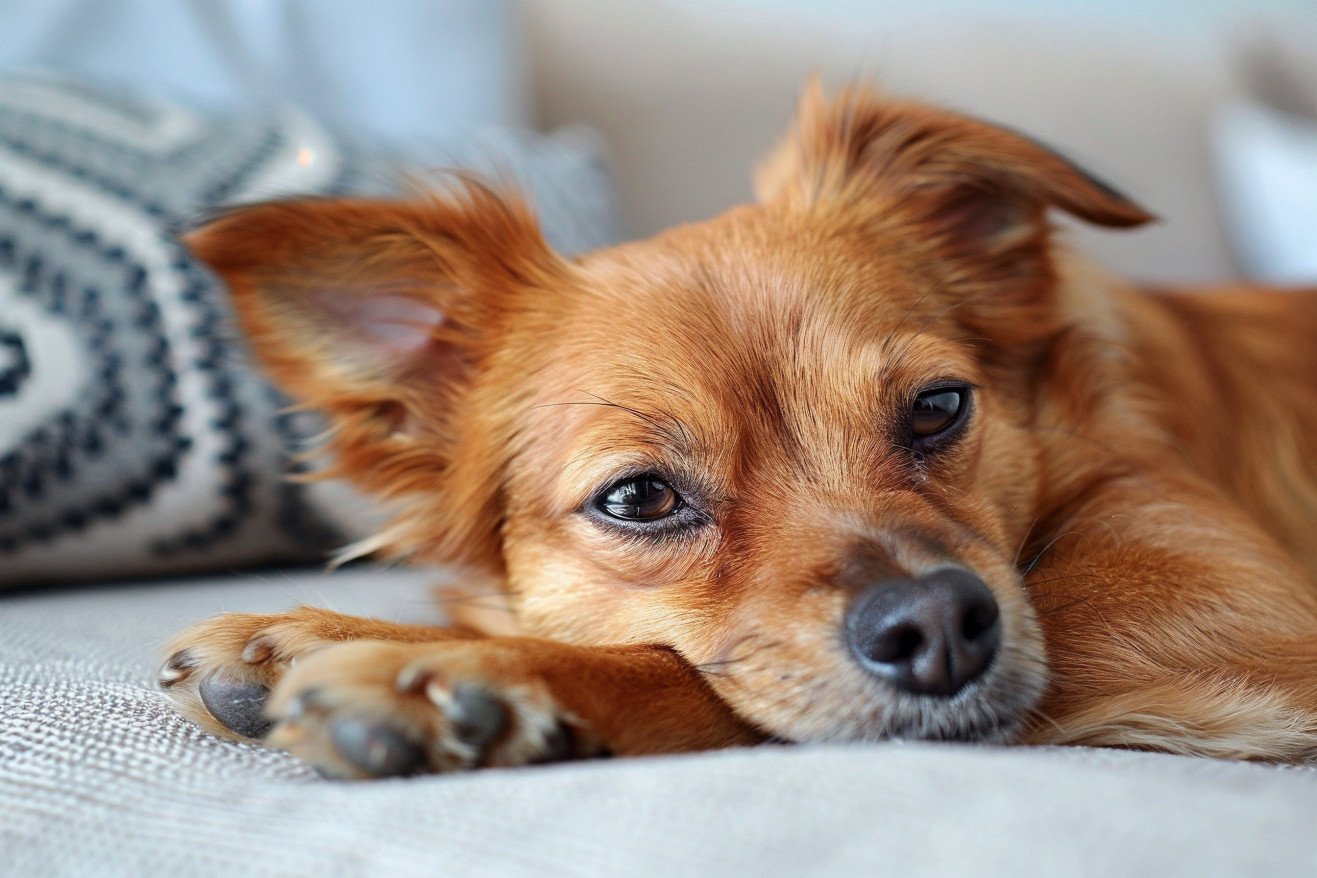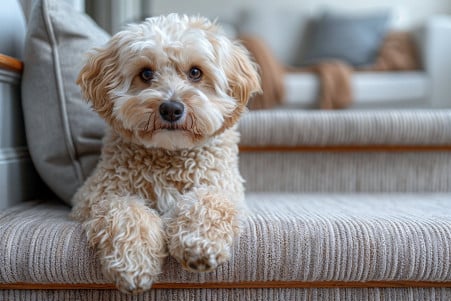Why Your Dog Suddenly Prefers to Sleep Alone? Understanding the Change
16 May 2024 • Updated 16 May 2024

What would make a dog who has always slept in bed with their humans suddenly want to sleep alone? While changes in a dog's sleeping habits can be a sign of an underlying medical issue such as pain, anxiety, or cognitive decline, it can also be a result of a temporary environmental factor such as the weather or a new sound or smell that's disrupting your dog's sleep.
To help make sense of this confusing change in behavior, we've turned to studies in veterinary medicine, animal behaviorists, and the experiences of dog owners. By exploring the physical and psychological influences on dogs' sleep, we've come up with some of the most common reasons dogs might want to sleep alone and offered advice on how to address the issue with kindness.
Why does my dog suddenly want to sleep alone?
Separation Anxiety: A Potential Cause of Sleep Disturbances
Separation anxiety is a serious condition where dogs become extremely distressed when separated from their owners, often displaying symptoms like excessive vocalization, destruction, restlessness, and even house soiling. According to WebMD, common signs include howling, barking, chewing, digging, drooling, panting, and attempts to escape.
This anxiety may contribute to a dog's sudden desire to sleep alone, as they feel more secure and less anxious when separated from their owner during sleep. A study referenced by Rover.com found separation anxiety can manifest as "social panic" behaviors like restlessness and vocalization specifically when separated.
For mild cases, WebMD suggests providing special treats when alone, minimizing greetings, leaving out worn clothes with your scent, and trying calming supplements. Rover also recommends establishing routines, teaching "settle" commands, crate training games, and using pheromone diffusers.
However, for more severe anxiety, a gradual desensitization process is needed to help the dog become comfortable being alone, slowly increasing alone time without distress. Rover suggests working with a trainer on this process over 2-6 months.
Ultimately, VCA Animal Hospitals emphasizes seeking professional help from an animal behaviorist or veterinarian, as separation anxiety can be complex to address properly. With the right treatment plan, your dog's sleep issues and overall wellbeing can improve.
Normal Sleep Changes in Older Dogs
In general, dogs tend to sleep more as they get older. While there is no hard and fast rule for when a dog is considered a "senior" due to the wide range of breeds and sizes, larger dogs are often considered seniors at 6-7 years old, and smaller dogs at 10-11 years old, according to the American Kennel Club.
The amount of sleep that is considered normal for a senior dog can vary between 14-15 hours and 18-20 hours a day, according to Dr. Ashley Rossman, DVM. This increased need for sleep is often due to age-related factors like cognitive decline, arthritis, hypothyroidism, or other medical conditions that can cause discomfort and disrupt sleep.
As the Orvis points out, it's important to watch for any sudden or extreme changes in an older dog's sleep habits, as these could be a sign of an underlying health condition that needs to be addressed by a vet. In general, orthopedic bedding, regular exercise, and managing any medical conditions can help older dogs get the rest they need.
Medical Issues That Can Disrupt a Dog's Sleep
There are a number of medical issues, both physical and psychological, that can lead to changes in a dog's sleep. The ASPCA notes that some of the most common physical issues that can lead to increased sleep or disruptions in sleep include pain due to arthritis or other musculoskeletal issues, heart disease, and other chronic diseases.
Meanwhile, psychological issues like anxiety, depression, and cognitive dysfunction can also affect a dog's sleep and even lead to a preference for sleeping alone. Research published in PMC showed that dogs with a higher level of attachment to their owners had more consistent sleep patterns, which indicates that a lack of attachment or emotional distress could lead to changes in sleep.
If a dog's sleep patterns change suddenly or drastically, it's important to talk to a vet to make sure there aren't any medical issues at play. As WagWalking explains, once the underlying medical issue is addressed, whether it's through medication, therapy, or a change in lifestyle, it can lead to an improvement in a dog's sleep and overall quality of life.
Environmental Factors That Affect a Dog's Sleep
Aside from medical and psychological issues, there are several environmental factors that can play a role in a dog's sleep patterns and needs. The ASPCA notes that changes in a dog's environment, such as moving to a new home, adding new members to the family, or changes in the household schedule, can disrupt a dog's sleep and even lead to a preference for sleeping alone.
Other external factors, such as noise, temperature, and strange smells or sounds, can also impact a dog's ability to sleep. One study cited by WagWalking showed that dogs are more likely to isolate themselves or become less responsive to their environment due to issues like age-related vision or hearing loss, which can cause them to feel more stressed or disoriented in their surroundings.
To ensure that dogs get the best sleep possible, it's important to make sure that their sleeping environment is consistent and comfortable and that there are no factors that could cause them stress or discomfort. The Orvis recommends using white noise machines, providing orthopedic dog beds, and sticking to a regular schedule. By making sure that your dog's environment is as stress-free as possible, you can help them feel more comfortable and get the rest that they need.
How to Help Your Dog Sleep Better
The most important thing you can do to help your dog sleep better is to address the underlying cause of their sleep disturbances, whether that's a medical issue, anxiety, or something else. The Kuranda Dog Beds blog notes that sticking to a consistent schedule that includes regular exercise and a predictable bedtime can help dogs get better rest.
Of course, it's also important to make sure that your dog's sleeping area is as comfortable and inviting as possible. The Kuranda blog suggests using orthopedic bedding to help relieve pressure on your dog's joints and placing your dog's bed near a heat source if they're feeling cold. Reducing any potential disruptions, such as noise and light, can also help your dog sleep more soundly.
If your dog's sleep disturbances are related to anxiety or cognitive dysfunction, Dr. Buzby's ToeGrips for Dogs recommends that you consider using calming supplements, pheromone products, or medications (with your vet's approval) to help reduce anxiety and improve your dog's ability to rest.
If your dog has stopped sleeping in your bed and you'd like to encourage them to start again, the Senior Dog Revolution suggests that you work to reintroduce your dog to your bed by using positive reinforcement and desensitization to help them feel more comfortable. This can help rebuild the bond and trust that they may have lost.
With a little effort and patience, pet owners can help their dogs sleep better by addressing the underlying cause of their sleep disturbances and making sure that their sleeping area is as comfortable and inviting as possible.
Conclusion: How to Help Your Dog Get Better Sleep
The bottom line is that there are many reasons why a dog might want to sleep alone, including separation anxiety, age-related issues, medical problems, and environmental issues. It's important to identify and address the cause of a dog's desire to sleep alone in order to help them get better sleep and improve their overall well-being.
By providing a safe, comfortable place to sleep, addressing any medical or behavioral issues, and seeking professional help when necessary, dog owners can help their pets get the sleep they need and strengthen their bond with their human family. In the end, it's important to be aware of our dogs' needs and to make sure that we're providing them with the care and support they need to be happy and healthy.


